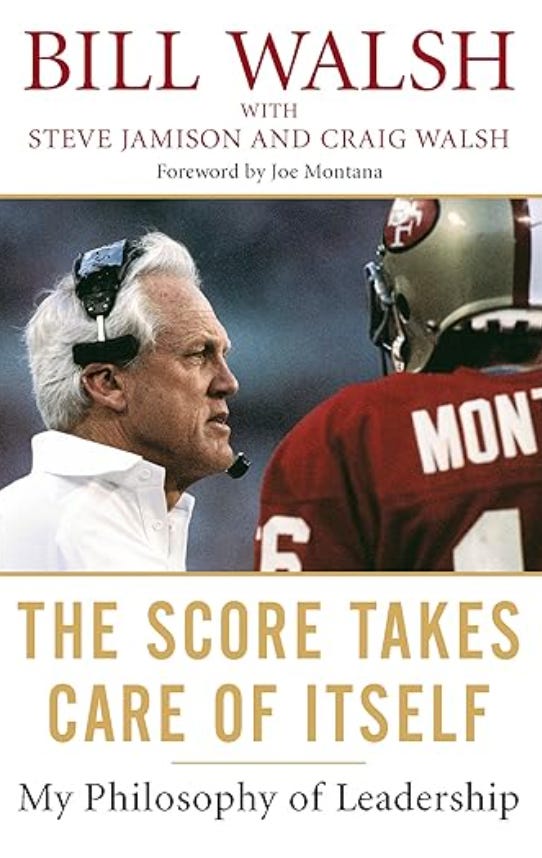
One of the best books I’ve read in the last two years is The Score Takes Care of Itself, by Hall of Fame football coach Bill Walsh.
It’s a book about football, yes, but in many ways, it’s also a book about life.
And lately, I can’t stop thinking about it.
For those who don’t follow football (or who didn’t spend their childhood devouring sports almanacs1), Bill Walsh coached the San Francisco 49ers of the National Football League (NFL) from 1979-1988. In ten seasons, Walsh won three Super Bowls — an astounding rate of success in such a short timeframe.
The Score Takes Care of Itself is a compilation of several interviews Walsh gave to writer Steve Jamison in the years after his retirement. (The book was published in 2009, two years after Walsh’s death.) It’s a masterclass on leadership, team-building, and success.
But its greatest purpose, in many ways, is as a cautionary tale.
“Zero points for winning”
Three Super Bowls in ten years is a remarkable achievement. But the surprising part is not the three Super Bowls — it’s the ten years.
Walsh had job security for life, and yet, by the end of the 10th year, he was finished, too physically and mentally drained to coach one more day of football.
Burnout.
It wasn’t always so dire. At the start of his 49ers tenure, Walsh was full of energy and enthusiasm as he built a winning culture from the bottom up. He instilled in his team that if you pay attention to the details and focus on the process, “the score takes care of itself.” You won’t win all the time, but you’ll win most of the time.
And it worked. In three years, the 49ers went from a 2-14 record to Super Bowl champion.
But over time, Walsh lost his way. He became almost too successful; any season that ended without a Super Bowl was now deemed a catastrophe. Instead of chalking up failure as something that happens on occasion, it became something to avoid at all costs, even though that was impossible.
The football season became a no-win scenario: either he wins and did what was expected of him, or he loses and is publicly humiliated by team owner Eddie DeBartolo, Jr.
Succeed, and he merely gets back to baseline. Fail, and he gets disproportionate scorn. He called this misery “Zero points for winning.”
And therein lies the irony. A man who once valued the importance of failure as a tool for self-improvement, who understood that you can’t control the final outcome, only how you play the game — had become so mortified of failure that it led to his mental and physical breakdown.
As Walsh put it: “Victory meant little more than delaying the pain of loss.”
This is why, despite winning Super Bowl XXIII in 1988, Walsh resigned after the season. Despite the exhilarating high of arguably the most famous final drive in NFL history, he couldn’t go on.
Seriously, a win doesn’t get any better than this:
And yet, after the game was over, he was utterly exhausted. He could barely stand and moments later burst into tears in the locker room.
Looking back, Walsh laments what burnout cost him. “That anxiety about failure, that disgust with failure, that fear of failure….took four or five years off of my coaching career at San Francisco,” he said.
His assistant, George Seifert, took his place. In the next six years, Seifert won two more Super Bowls.
We see this in everyday life
“Zero points for winning” doesn’t just apply to sports; it also applies to life and how we handle our ups and downs, wins and losses, succeses and failures.
Once you see it, you can’t unsee it. It’s everywhere.
For example:
You’re trying to follow an exercise regimen. You give yourself no credit for going to the gym, but if you skip a day, you beat yourself up.
You’re an entrepreneur desperate to succeed. You ignore the meaningful milestones along the way — first employee, first dollar raised, first prototype — because you’re so fixated on the end goal. But any slip-up — from a lost customer to a production delay — sends you into a tailspin.
You’re taking a math class. You get A’s on all your exams, but chalk it up as “what you were supposed to do”. But then you get a C-, which makes you feel like a failure.
Succeed? Zero points.
Fail? Minus 1,000 points.
Sadly, this has been my attitude the last few weeks.
If I did something well, rather than reflect on how far I’ve come, I chalked it up par for the course. Whether it was writing my newsletter, finishing the latest draft of my book, or giving a successful talk, I didn’t stop and think, “You’re crushing it today!” Instead, I shrugged and went, “You did what you were supposed to do. So what?”
But when I failed, I took it personally.
Slow newsletter growth? I’m a failure.
Rejected job application? I’m unemployable.
A writer who didn’t want to collaborate? No one wants to work with me.
Somewhere along the way, success lost its sweetness. Failure, meanwhile, became even more bitter.
No wonder I struggled.

Scary? Yes. But there’s a way through it.
“Zero points for winning” is unsustainable over the long term, as Walsh eventually learned. Fortunately — as with any cautionary tale — there are lessons we can take from his experience.
What follows are nine ways we can balance the ledger between success and failure. The first four are supplied by Walsh (with my commentary); the last five are my additions:
Don’t isolate yourself
Surround yourself with people you trust — a friend, parent, mentor, spouse, or a network of advisors — who can give you a healthy dose of reality. If you’re discounting your successes or lamenting your failures, they can put you in your place.
Delegate!
When we care so much about the outcome of something, the urge is to control the process from start to finish. But doing everything is a one-way ticket to burnout.
Don’t be afraid to delegate and offload some of your responsibilities. Walsh lamented not trusting his assistants more, many of whom went on to become successful NFL coaches.
Don’t define yourself by your “won-loss record”
Towards the end, Walsh equated his value with whether or not he won the Super Bowl. He realized his error after the fact:
“You must derive satisfaction and gratification from winning without letting it define your self-worth, just as you cannot allow defeat to define you as a person.”
It’s tempting to judge our value based on what we accomplish, but in reality, we are so much more than our “win-loss record”. Our worth comes from who we are, not our achievements.
If you fail — and you will — don’t take it personally or let it pervade every aspect of your life. A failure in one area doesn’t make you a failure in all areas.
Shake it off
Accept that failure is a part of life.
Okay, so you failed. Instead of tearing yourself to pieces, learn from it and shake it off. Otherwise, as Walsh experienced, it’ll eat you up inside.
We can do everything right and still lose. We can prepare exceptionally, execute exceptionally, and still come up short. The world is so complex, it’s impossible to account for every variable, not to mention all the fluky occurrences that can thwart our plans. Injuries, foul weather, crises halfway around the world — anything can happen.
Here are five more I’d add to the list:
Celebrate your victories
Just because you’re supposed to do something and it leads to success, doesn’t mean it should be discounted. Executing a plan is still a big deal.
Give yourself points for victory! You don’t have to pop champagne because you chose a salad instead of a burger, but give yourself credit when warranted. Success is never, ever a given.
Success (and failure) aren’t everything
This is similar to point #3.
Success is fine, but it’s not everything. There’s so much more to life than winning and losing.
There’s loving relationships. Moments of quiet contemplation. Finding your purpose. Laughter. Lazy days and vacations. Serving others. And so on.
Don’t get tunnel vision about achieving goals; otherwise, you’ll never be satisfied.
Don’t get stuck on the success hamster wheel
Success raises expectations. You succeed, and then you’re expected to succeed over and over again. This can quickly become a curse.
Make sure that you don’t end up in a situation where you need to succeed more and more just to keep pace — the success hamster wheel.
One of the reasons Walsh burned out was that the 49ers owner, Eddie DeBartolo, Jr., expected him to win a Super Bowl every year. When they fell short, Walsh got an earful.
What was once a joyous work culture had became toxic, and the only antidote was more winning. That was the only way to keep the vitriol at bay.
The best time to escape the success hamster wheel is before it spins too fast. If the price of failure is getting too steep for you, it might be time for a change.
Equanimity
A more sustainable approach is to treat success and failure the same way, to paraphrase Rudyard Kipling. Don’t get too high or too low. If you’re going to give yourself zero points for winning, then give zero points for losing too. Focus on processes, not outcomes.
Appreciate how far you’ve come
Think about how your former self would appreciate where you are today. If Walsh thought back to early in his career when he couldn’t get a head coaching job, he would have been proud of how far he’d come. His former self would have been thrilled to win one Super Bowl, let alone three.
A valuable life skill
Success is rewarding, but failure is valuable too. It builds character, cultivates resilience, and teaches us what we can do better next time.
We can’t always succeed. No matter what we do, we’re going to fail at some point. The right attitude is everything, but as Walsh learned, it’s easier said than done.
One of the most valuable life skills is learning how to lose. Learn it, and you’ve already won.
Related articles
Guilty as charged.










Fantastic piece, Chris!! This hits a nerve as a type A perfectionistic who has chronically defined my self-worth by my achievements. You’re so right — we can’t always win, and failure doesn’t make us less worthy or diminish the things we do well. The advice you’ve offered here is incredibly valuable and insightful. Celebrating our wins is an underrated but powerful tip. I started noting down all my favourite lines and was pretty much quoting the whole piece 😆